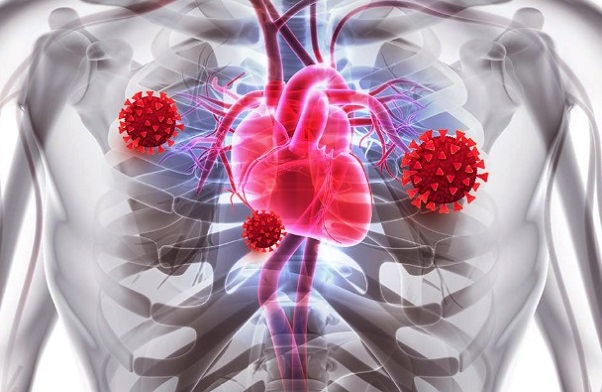Surge in Heart Problems in Muscle Disease Patients After COVID-19 Exposure Alarms Doctors
Nikhil Prasad Fact checked by:Thailand Medical News Team May 18, 2025 8 months, 3 weeks, 6 days, 2 hours, 38 minutes ago
Medical News:
New findings reveal how COVID-19 triggers long term heart complications in patients with autoimmune muscle disorders
In a recent eye-opening study, researchers from West China Hospital of Sichuan University, Chengdu First People’s Hospital, and Tianfu College at Southwestern University of Finance and Economics in China have uncovered startling evidence that COVID-19 may significantly alter the course of a rare autoimmune disease known as idiopathic inflammatory myopathies or IIMs. The disease, which normally targets the muscles of the body, appears to become more dangerous when a patient has previously been infected with the SARS-CoV-2 virus.
 Surge in Heart Problems in Muscle Disease Patients After COVID-19 Exposure Alarms Doctors
Surge in Heart Problems in Muscle Disease Patients After COVID-19 Exposure Alarms Doctors
This
Medical News report focuses on the growing concerns over post-COVID-19 health complications, especially among individuals already living with autoimmune disorders. The research revealed that those with IIMs who had previously contracted COVID-19 experienced significantly more cardiac issues compared to those who had never been infected with the virus.
What Are IIMs and Why COVID Makes Them Worse
IIMs are a group of autoimmune conditions that inflame and weaken the skeletal muscles, especially those in the hips, shoulders, and thighs. But scientists have long suspected that infections, including viral ones, may influence how severe or complicated these diseases can become. COVID-19, with its multi-organ impact and association with long-lasting symptoms, is now being firmly linked to worsening health in people with IIMs.
To better understand this, researchers studied 292 patients with IIMs who were admitted to West China Hospital between January 2022 and December 2023. Of these, 171 had a history of COVID-19 infection, while 121 had never been infected. Their medical histories, lab results, and heart scans were analyzed in depth.
Key Findings Show Greater Heart Damage in Post-COVID Patients
The most dramatic differences were seen in heart health. The post-COVID IIM group showed a significantly higher rate of cardiac injury. Specific heart problems found included:
-Myocarditis (heart inflammation) was diagnosed in nearly 13% of post-COVID patients compared to only 4% in non-COVID patients
-Over 77% of those who had COVID showed signs of cardiac injury, versus 63% in the other group
-Symptoms like heart palpitations and difficulty breathing were more frequent in those with a history of COVID-19
-Blood tests and echocardiograms also revealed troubling signs. Post-COVID IIM patients had elevated levels of cardiac stress biomarkers such as cardiac troponin T, myoglobin, and NT-proBNP. These are chemicals the heart releases when under strain or injury.
-Heart ultrasounds further revealed that those who had recovered from COVID-19 had larger left ventricles and left atria—two of the heart’s
main chambers. This kind of enlargement is typically a sign of heart stress and can lead to long-term complications if left unchecked.
Molecular Clues Point to Inflammation and Oxidative Stress
Going a step further, the team used bioinformatics tools to compare gene activity in the heart tissues of COVID-19 patients and the muscle tissues of patients with dermatomyositis—a subtype of IIMs. They discovered that both sets of patients had overlapping gene activity linked to inflammation, collagen production, and oxidative stress.
This suggests that SARS-CoV-2 might not only cause direct damage to the heart, but could also trigger immune system pathways that continue to harm the body long after the virus has cleared.
Other Alarming Changes in Post COVID IIM Patients
Beyond heart damage, the study also found that the types of autoantibodies found in IIM patients shifted after COVID infection. Notably:
-Anti-Ro52 antibodies and anti-ARS antibodies were more common in post-COVID IIM patients
-These antibodies are often linked to more severe disease and worse outcomes
Additionally, while post-COVID patients had more white blood cells and neutrophils—signs of ongoing inflammation—they had lower fibrinogen and platelet counts, suggesting possible problems with blood clotting, another known complication of long COVID.
Why This Study Matters for Patients and Doctors
This study makes it clear that COVID-19 doesn’t just cause temporary illness. In people with autoimmune conditions like IIMs, the virus can have lasting and dangerous effects, particularly on the heart. Doctors treating such patients should remain vigilant even months after the initial COVID-19 infection has cleared.
There are still many unanswered questions, including whether COVID-19 can actually trigger the onset of IIMs in people who never had it before, and why specific types of muscle inflammation and heart damage occur more frequently post-infection. But the evidence is growing stronger that the virus reshapes the immune system in harmful ways that persist.
Conclusion
The findings of this study underscore the hidden dangers COVID-19 poses for people with existing autoimmune diseases like idiopathic inflammatory myopathies. It not only worsens the disease's symptoms but also adds serious complications involving the heart. Patients with a history of COVID-19 must be closely monitored for signs of cardiac distress even after they appear to have recovered. The long-term damage may not always be obvious but could prove fatal if missed. A deeper understanding of the biological pathways affected by COVID-19 could lead to better treatments, but for now, awareness and early detection remain key in protecting these vulnerable individuals.
The study findings were published in the peer reviewed journal Microbiology Spectrum.
https://journals.asm.org/doi/10.1128/spectrum.00134-25
For the latest COVID-19 News, keep on logging to Thailand
Medical News.
Read Also:
https://www.thailandmedical.news/news/covid-19-induces-ferroptosis-transcriptomic-alterations-within-the-heart-causing-cardiac-damage
https://www.thailandmedical.news/news/american-study-discovers-that-covid-19-alters-heart-glycosylation-leading-to-potential-cardiac-complications
https://www.thailandmedical.news/news/covid-19-news-scientist-from-china-find-that-oas-genes-play-a-key-role-in-sars-cov-2-induced-heart-failure
https://www.thailandmedical.news/articles/coronavirus
https://www.thailandmedical.news/pages/thailand_doctors_listings
